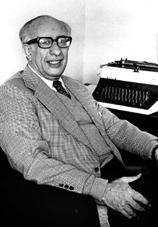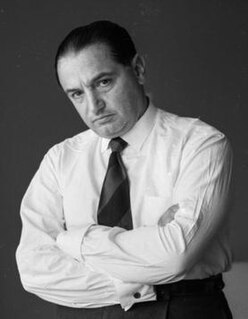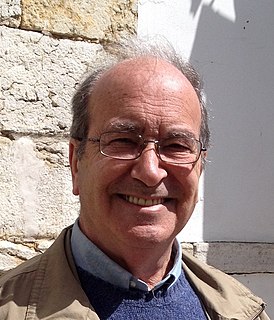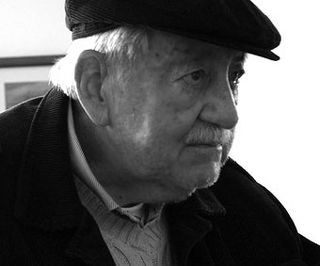
Alejandro Carrión Aguirre was a poet, novelist and journalist. He wrote the novel La espina (1959), the short story book La manzana dañada (1983), and numerous poetry books. As a journalist he published many of his articles under the pseudonym "Juan Sin Cielo." In 1956 he founded, along with Pedro Jorge Vera, the political magazine La Calle. He directed the literary magazine Letras del Ecuador. He received the Maria Moors Cabot prize (1961) from the Columbia University Graduate School of Journalism as well as the Ecuadorian National Prize Premio Eugenio Espejo (1981) for his body of work. He was the nephew of Benjamín Carrión and Clodoveo Carrión.
Iván Carvajal Aguirre is an Ecuadorian poet, philosopher and writer. In 1984 he received Ecuador's National Prize for Literature, the "Aurelio Espinosa Pólit" prize, for his work entitled "Parajes". In February 2013 he won the Premio a las Libertades Juan Montalvo.

Jorge Icaza Coronel, commonly referred to as Jorge Icaza, was a writer from Ecuador, best known for his novel Huasipungo, which brought attention to the exploitation of Ecuador's indigenous people by Ecuadorian whites.

Jorge Carrera Andrade was an Ecuadorian poet, historian, author, and diplomat during the 20th century. He was born in Quito, Ecuador in 1902. He died in 1978. During his life and after his death he has been recognized with Jorge Luis Borges, Vicente Huidobro, Gabriela Mistral, Pablo Neruda, Octavio Paz and Cesar Vallejo as one of the most important Latin American poets of the twentieth century.

The García de Nodal expedition was chartered in 1619 by King Philip III of Spain to reconnoiter the passage between the Atlantic and Pacific oceans, rounding Cape Horn, south of Tierra del Fuego, just discovered by the Dutch merchants Jacob Le Maire and Willem Schouten. It was a successful expedition, as all goals were reached. In addition, neither lives nor ships were lost and the whole was done in a small amount of time.
Fernando Jurado Noboa is an Ecuadorian psychiatrist, historian and genealogist.

Juan Manuel Rodríguez López is a Spanish-born, naturalized Ecuadorian author and professor. He holds a licenciate/BA degree in philosophy and a doctorate in literature from Pontificia Universidad Católica del Ecuador (PUCE). He was a professor at Universidad Central del Ecuador and Universidad Católica, as well as a founding professor of Universidad San Francisco de Quito, where he was Dean of the College of Communication and Contemporary Arts.
Leonardo Cárdenas Palacios is an Ecuadorian composer, pianist and orchestra director. He studied at the Conservatorio de Música Salvador Bustamante Celi in Loja with many famous musicians, both Ecuadorian and from abroad.

Luis Alberto Costales Cazar was an Ecuadorian poet, philosopher, teacher, speaker, historian, farmer and politician.
Nelson Estupiñán Bass (1912–2002) was born in Sua, a city in the predominantly Afro-Ecuadorian province of Esmeraldas in Ecuador. He was first homeschooled by his mother before traveling to the capital city of Quito where he graduated from Escuela Superior Juan Montalvo with a degree in public accounting in 1932. Bass identified with the Communist Party during this time and in 1934 had the opportunity to publish two of his poems in the socialist diary La Tierra.

Filoteo Samaniego Salazar was an Ecuadorian novelist, poet, historian, translator, and diplomat. He became a member of the Ecuadorian Academy of Language in 1984, and was its secretary from 1996–2006. He was awarded Ecuador's most prestigious prize, the Premio Eugenio Espejo, in 2001. Samaniego's diplomatic career began in 1949 as the chief of staff of the Ministry of Foreign Affairs of Ecuador. He served as Ecuador's Ambassador to Austria, Germany, Romania and Egypt; and was a permanent representative of Ecuador to the United Nations Industrial Development Organization (ONUDI); and held many other academic, national, and international posts in his lifetime. He translated books from French to Spanish, including the Spanish translation of Chronique (1960) by the French Nobel laureate Saint-John Perse.

Horacio Hidrovo Peñaherrera was an Ecuadorian poet, writer, professor, and cultural promoter.

Aurelio Espinosa Pólit was an Ecuadorian writer, poet, literary critic, and university professor. He co-founded the Pontifical Catholic University of Ecuador, and he founded the Aurelio Espinosa Polit Museum and Library in Quito.

Carmen Acevedo Vega was an Ecuadorian poet, writer, and journalist.

Luis Aguilar-Monsalve is an Ecuadorian writer, critic, and professor emeritus at Hanover College.
Enrique Ojeda(born 1928) was a professor at Boston College for 30 years, is the author of several books about Latin American literature, and has been called "the world's leading authority" on Ecuadoran poet Jorge Carrera Andrade. Ojeda has also written extensively on Ecuadoran novelist Jorge Icaza.

Fernando Soto Aparicio was a Colombian poet, storyteller, playwright, novelist, librettist, and screenwriter. He was born in Socha, in the Department of Boyacá. Fernando Soto Aparicio spent his childhood in Santa Rosa de Viterbo. He is remembered for the novel The rebellion of the rats. After several decades as a professor at various universities in the country, in 1961 he was exalted with the prize Selecciones Lengua Española, in 1970 he received the Casa de las Américas Prize, and a year later, the prize City of Murcia. In total, he wrote about 70 literary works, among them novels, poems, books of short stories, as well as theatre plays.

Siomara España Muñoz is an Ecuadorian poet, essayist, professor and literary critic. She is director of the area of Literature of the House of Culture Núcleo del Guayas.

Efraín Andrade Viteri was an Ecuadorian painter known as "The Painter of the Négritude Esmeraldeña".

Luis Cadena was an Ecuadorian painter. He worked principally in portraiture but also painted many religious subjects for the Roman Catholic Church. He was appointed director of the Academia de Dibujo y Pintura in Quito in December 1860 and served as director of the Escuela de Bellas Artes of the same city from 1872 to 1875.















